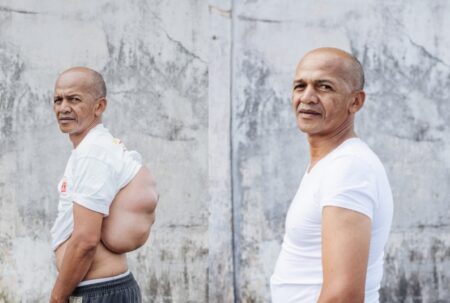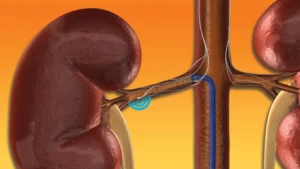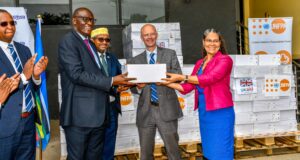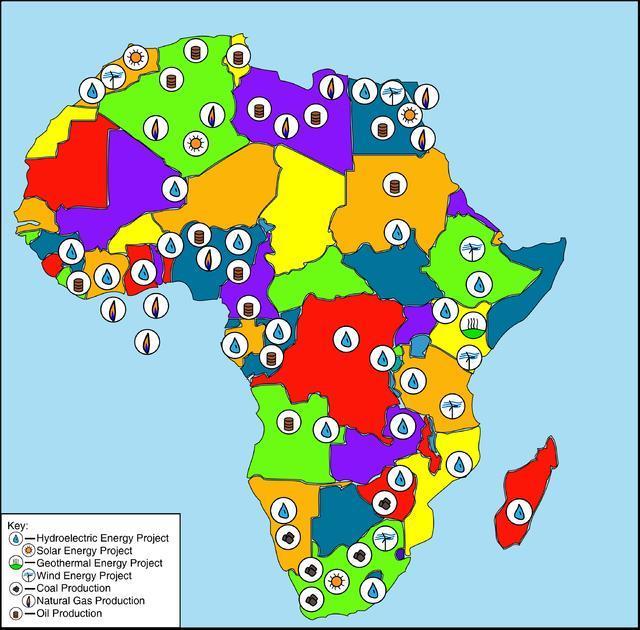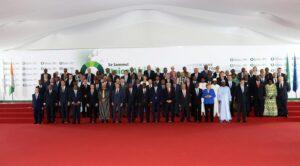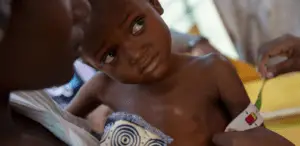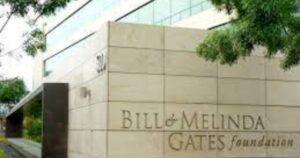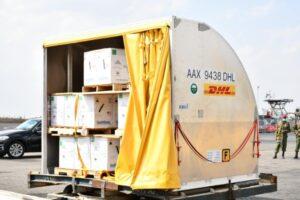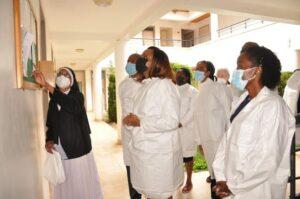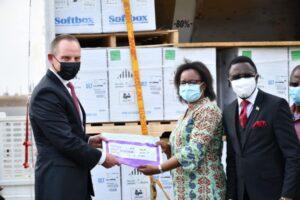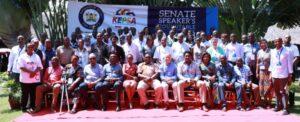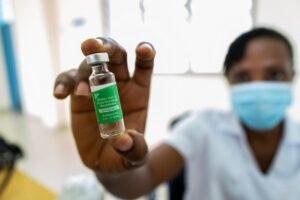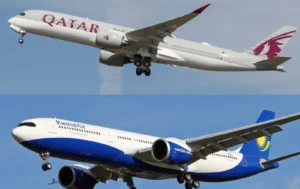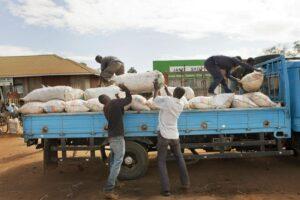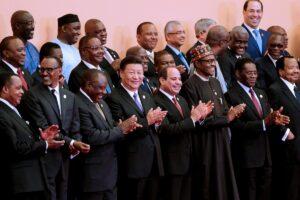- Africa’s new dawn: the rising role of digital and AI in agriculture
- Can Dangote Refinery Transform Africa Energy Ambition
- Gallup Survey: 80 per cent of Kenyan Workers Are Disengaged and Seek New Opportunities
- Madagascar Man Freed from 5KG Tumor After 15-Year Struggle
- How women in Africa are perceived and treated
- Sugar consumption in Kenya to Increase to 1.23 Million Tonnes
- Can Somalia and Turkey Oil deal Bring Change in Somaliland
- Remittances to Kenya dropped to $371.6 million in June, marking a six month low
Health
- Madagascar man freed from 5KG tumor after the four-hour surgery, his family, including his wife, daughter, and sister, were all waiting for him outside
- By age 53, Fidisoa struggled to do the high level of manual labor required from his livelihood
- He said that the benign tumor, a soft lobular fibroma which weighed 5 kilograms, was now gone for good
A father of three can sleep comfortably on his back for the first time in 15 years after having a massive tumor – weighing 11lbs (5kgs) – removed by surgical charity Mercy Ships.
Malagasy builder and rice farmer Fidisoa was 38 when what appeared to be a tiny pimple on his back started to grow, first into a lump and then into the size of a fist. It continued to grow until Fidisoa looked as if he carried a backpack underneath his shirt.
By age 53, Fidisoa struggled to …
- Dr. Patil VijaySinh, an interventional cardiologist at The Nairobi West Hospital, led the team in performing the Renal Artery Denervation procedure.
- Hypertension, commonly known as high blood pressure, is a major global health concern, contributing to an estimated 8.5 million deaths in 2015 alone.
- Innovative healthcare techniques like Renal Artery Denervation offer new hope for patients with resistant hypertension.
The Nairobi West Hospital has successfully conducted the first Renal Artery Denervation procedure for resistant hypertension in Kenya and East Africa.
This pioneering procedure marks a significant step forward in the region’s battle against hypertension, a leading cause of cardiovascular morbidity and mortality worldwide.
Hypertension, commonly known as high blood pressure, is a major global health concern, contributing to an estimated 8.5 million deaths in 2015 alone.
Despite the availability of various antihypertensive medications, only 18-23 per cent of patients achieve optimal blood pressure control.
In Kenya, prevalence of hypertension is …
- Estimates show that family planning in Kenya prevented 2.4 million pregnancies in 2023.
- The 2023 report shows significant achievements in family planning across the globe, even in the face of stagnant funding.
- The contraceptives were procured by UNFPA with more than KES57 Million (£348,000) funding from the UK.
Efforts to make family planning more accessible to women in Kenya received a boost with the handover of 450,000 doses of Subcutaneous Depot Medroxyprogesterone Acetate (DMPA-SC), a self-injectable contraceptive that simplifies and enhances the accessibility of family planning.
The contraceptives were procured by the United Nations Population Fund (UNFPA) with more than $378,151 (KES57 Million) funding from the UK Government, and will be distributed by the Ministry of Health to health facilities across the country.
DMPA-SC is a user-friendly injectable contraceptive that can be administered by trained individuals, including community health workers and women themselves, thereby expanding access to family planning …
- The Foundation has announced a commitment of up to $120 million to accelerate access to the investigational antiviral drug molnupiravir
- The Foundation said the funding will be allocated based on consultations with partners
The Bill & Melinda Gates Foundation has announced a commitment of up to $120 million to accelerate access to the investigational antiviral drug molnupiravir for lower-income countries as part of its COVID-19 response effort.
In a statement, the Foundation said the funding will be allocated based on consultations with partners, and will support the range of activities required to develop and manufacture generic versions of the drug, which is being developed by Merck & Co in collaboration with Ridgeback Biotherapeutics.
The commitment builds on the foundation’s ongoing efforts, including $1.9 billion in funding, since the start of the pandemic to increase access to COVID-19 vaccines, treatments, and tests by supporting R&D, regulatory work, at-risk manufacturing, and product …
The Africa Centres for Disease Control and Prevention, Africa CDC, has issued a statement on the recent international travel rules in the context of the COVID-19 pandemic.
The Specialised Technical Institution of the African Union, noted in a statement that the planned changes to international travel rules are discrminative.
The rules were communicated by the Government of the United Kingdom (U.K), which will be enforced starting at 4:00 am on Monday 4th October 2021.
Also Read: Public, private sector investment needed for vaccine manufacturing: EAC
“With a full course of the Oxford/AstraZeneca, Pfizer BioNTech, Moderna or Janssen vaccines from a relevant public health body in Australia, Antigua and Barbuda, Barbados, Bahrain, Brunei, Canada, Dominica, Israel, Japan, Kuwait, Malaysia, New Zealand, Qatar, Saudi Arabia, Singapore, South Korea, Taiwan or the United Arab Emirates (UAE). Formulations of the 4 listed vaccines, such as AstraZeneca Covishield, AstraZeneca Vaxzevria and Moderna Takeda, qualify as …
In Kenya, more than 12,000 people have end-stage kidney disease requiring dialysis. Currently, more than 5,000 patients are on dialysis in Kenya. This is according to data provided by the ministry of health.
There are currently 214 dialysis units countrywide in our public (54), private (143) as well as faith-based (17) health facilities.
According to the Chief Administrative Secretary Ministry of Health Dro Mercy Mwangangi, what is astonishing is there are only 41 nephrologists and 560 nurses in the country to deal with all these patients.
All is not doom
Dr Mwangangi says that there have been success stories that have given life to our kidney patients. According to The ministry of health statistics, 661 kidney transplants have been carried out in the country since 2006. Thanks to you my fellow doctors in the room some of whom if not all have been responsible for this great success.
Also Read:
…For the first time, Pfizer vaccines from the United States have landed in the country.
The country received 795,600 doses of the expected 1.4 million doses of Pfizer vaccine provided by the US Government.
Due to the nature of the Pfizer vaccines, they can only survive in extremely low temperatures which is minus 70
degrees. The government thus had to make prior arrangements with its partners to acquire ultra-cold storage and install it to maintain the quality of the vaccines.
To enable the use of Pfizer vaccines in Kenya, United Nations Children’s Fund (UNICEF) has recently procured 12 ultra-low temperature freezers and accessories with funding from the Government of Japan.
The Pfizer vaccine is the 4th type of Covid-19 vaccine to be deployed in the country making an approximate number of doses received so far over into the country 6.3 million in their various assortments.
These vaccines will go a …
The Kenya Private Sector Alliance (KEPSA) has reaffirmed its commitment to the governments effort in combating the deadly COVID-19 pandemic.
In a statement to newsrooms, KEPSA noted that it has been at the forefront in coordinating the private sector response and complementing the government’s efforts towards combating the effects of the Covid-19 pandemic on the economy, general health, and social wellbeing of Kenyans.
“We would like to affirm the government’s position, reiterated by the Health Cabinet Secretary Mr Mutahi Kagwe on private sector’s partnership through KEPSA on the vaccine initiative. We have partnered with the government through the Ministry of Health (MOH) in a bid to support the government in shouldering the burden of vaccinating Kenyans,” KEPSA noted.
This will accelerate the pace of vaccinations and get the country closer to herd immunity by the end of the year and get the economy to rebuild back better.
Also Read: KEPSA’s
…Kenya and Uganda are among the countries selected for the Phase 1 clinical trial of an HIV vaccine. According to the Globally Relevant AIDS Vaccine Europe-Africa Trials Partnership (GREAT), the first dose will be given in Lusaka, Zambia while Kenya and Uganda will receive the vaccines in a few weeks.
Dr. William Kilembe, project director of the Center for Family Health Research in Zambia (CFHRZ) and trial principal investigator, said that international partnerships are crucial in developing and evaluating HIV vaccine candidates in countries and communities where HIV vaccines will ultimately have the greatest public health impact.
“CFHRZ is proud to be part of the consortium evaluating HIVconsvX and to deliver the first dose of this experimental HIV vaccine in the HIV-CORE 006 trial,” he said.
The trial will see 88 healthy, HIV-negative adults, aged 18-55, who are considered not to be at high risk of infection, receive one …





